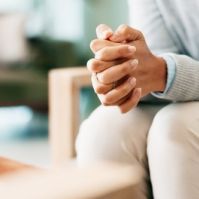 June is designated PTSD Awareness Month. The American Psychiatric Association defines PTSD as “posttraumatic stress disorder. . . . [A] psychiatric disorder that can occur in people who have experienced or witnessed a traumatic event such as a natural disaster, a serious accident, a terrorist act, war/combat, rape or other violent personal assault.”
June is designated PTSD Awareness Month. The American Psychiatric Association defines PTSD as “posttraumatic stress disorder. . . . [A] psychiatric disorder that can occur in people who have experienced or witnessed a traumatic event such as a natural disaster, a serious accident, a terrorist act, war/combat, rape or other violent personal assault.”
PTSD is not uncommon. According to the National Center for PTSD, about 8 percent of the population will have symptoms of PTSD at some point in their lives. Women tend to develop PTSD more often than men, but many men in the military come home from combat and deal with it.
A person with PTSD is not weak. PTSD can happen to anyone. In women, it’s more often associated with sexual assault or child sexual abuse. Men tend to experience PTSD following an accident, combat, disaster or physical assault. Generally, PTSD symptoms will not go away on their own. Professional treatment will be required. But the good news is that treatment works.
Symptoms of PTSD
Although each person experiences symptoms differently, here are the four most common types of symptoms:
- Flashbacks or nightmares that make you feel as if the event is happening again. Sometimes even seeing a news report about a similar event can trigger unwelcome memories.
- Avoiding situations that remind you of the event. A person who was mugged on the bus may not feel comfortable taking the bus anymore.
- You may feel more negative than you did before the event. You may experience guilt and shame about the event, believing if you had just done something different, you could have prevented it from happening.
- You may also feel jittery or on edge. You’re always looking for danger. Many people with PTSD startle easily.
The best way to know if you or a loved one is struggling with PTSD is to talk to a mental health provider or even your doctor. Once you’ve talked about your symptoms and gotten a diagnosis, you can address how to treat your symptoms and get better to enjoy life.
The Role of Spirituality in Treatment
Although PTSD is best treated with the help of a mental health provider, religious beliefs can often help in treatment. The spiritual community can provide empathy, encouragement and emotional support while you’re going through treatment. Many PTSD survivors feel lonely and isolated but having a church for support can be extremely beneficial.
Spiritual beliefs can also help survivors make some sense out of the traumatic experience. It’s not thinking that God caused the trauma but believing that Romans 8:28—“in all things God works for the good of those who love him, who have been called according to his purpose”—is true. By questioning faith and beliefs, survivors may come out with stronger values.
Many PTSD survivors struggle with guilt after a trauma. Religious values about forgiveness and doubt can help put guilt in its place. Again, by asking difficult questions about morals and the right course of action, survivors can deepen their beliefs in their faith. However, it may take some serious conversations with spiritual leaders who can help PTSD survivors make sense of their guilt.
PTSD survivors often deal with grief and loss after a trauma. Prayer and religion are significant coping mechanisms for people who are grieving. Many people rely on spirituality following death and loss, whether it was traumatic or not. Spiritual beliefs often provide the frame for making peace with loss. Here, too, the sense of community can also be part of the healing process.
Blend Spiritual Practices With Mental Health Treatment
PTSD may be a mental health issue, but faith and religion can help survivors heal and find peace. Don’t rule out spiritual guidance and pastoral care in helping people cope with PTSD.



